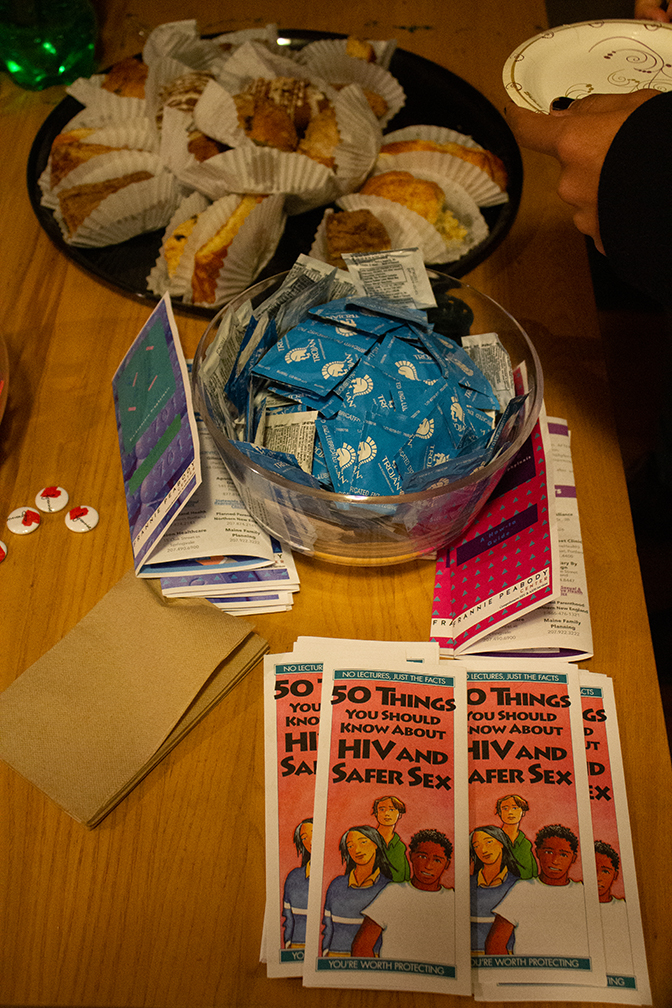Maine experts talk HIV activism and concerns
January 31, 2020
On Monday night, students gathered in Quinby House for “Real Talk on HIV” to discuss medical activism with HIV/AIDS experts in Maine. The panel offered insights from Executive Director of the Frannie Peabody Center Katie Rutherford and Co-Chair of the Maine HIV Advisory Committee Stash Bayley and was moderated by Assistant Professor of Sociology Theo Greene.
Bayley and Rutherford shared their first-hand experiences as activists advocating for communities affected by HIV/AIDS with a group of about 40 students. About seven years ago Rutherford began working for the Frannie Peabody Center, Maine’s largest HIV Service Organization.
Bayley works for the Maine HIV Advisory Committee, which prioritizes speaking to groups pushing for states to strengthen ally participation and implement resources to improve the quality of the lives of those affected by HIV/AIDS. Bayley, who was diagnosed with HIV four years ago, emphasized how refreshing it was to connect with a group of young people who are concerned about such a cause.
“It’s been a long time since I’ve actually sat in front of a number of young people who reminded me a great deal of what it was like before I acquired HIV,” Bayley said.
When asked why people who may not be directly impacted by HIV/AIDS should engage with the issue, the panelists and Greene articulated that this issue affects everyone to some degree, especially students on college campuses. Rutherford added that collaboration in the HIV/AIDS movement may serve as a model for combating other global crises.
“It’s not going to be the only [epidemic] that we experienced in our lifetimes, and we’d have to pay attention to how we treat each other and how we deal with these challenges,” Rutherford said.
Shining light on challenges that result from the stigma around the HIV/AIDS community, Bayley further highlighted how activist efforts can produce more empathy for the humanity of those affected. He described how his diagnosis and direct involvement in the cause made him poignantly aware of the difficulty in changing people’s preconceptions and overcoming biases.
“We essentially end up drifting in the direction of the prevailing winds, and we get quiet, and we become less participatory in our world,” said Bayley. “We become riddled with anxiety and guilt and shame, and all these things that essentially deplete your self concept over time.”
The panelists also covered the lack of HIV/AIDs education and activism in Maine due to it being a low incidence state. As a result of this small presence, there is a large misconception in Maine, according to Rutherford, and there is little urgency to address the epidemic.
“I hear all the time, ‘Oh yeah, isn’t there a cure for that? … Can’t you just [take] meds and everything’s fine?’” said Rutherford, “And [that] doesn’t fully explain the unique challenges and experiences for people living with HIV in trying to start talking about this on the way up here.”
Such unique challenges include the experiences of those who live undiagnosed or have no access to medical care as well as others affected by the complexities of social stratifications due to race and sexual stigmas.
The organizers of the talk—Kate Stern, associate dean of students for inclusion and diversity and director of the center for sexuality, women and gender, Blaine Stevens ’22 and Archer Thomas ’21—collaborated with the Center for Sexuality, Women and Gender, Peer Health and Quinby House. Stevens pushed for this talk as part of a continuous effort to bring attention to the importance of HIV/AIDS visibility on campus. Last year, she initiated a poster campaign and created a banner for students to sign on World AIDS day.
Stevens asked Greene to moderate the panel after she was in one of his classes. She admires his work on the interplay of gay neighborhoods, gay rights and sociology—ideas paramount to the AIDs dialogue. In his opening speech, Greene touched on the topic’s personal significance for him as a gay man, and the indispensable role of engagement in this narrative.
“I was only a year old when the news stories first came out about the new gay cancer,” said Greene. “And so growing up in the ’80s, as a child and exploring those questions of my sexuality … [I was also] resisting that coming out meant that I was destined to die, to contract HIV.”
“I was blown away by how many students came out to hear about this cause … I want to continue to raise awareness of the HIV/AIDS epidemic with further programming dedicated to this cause … I would love to host [future] events like an HIV testing clinic, a film screening of ‘How To Survive A Plague,’ or even discussions with other local activists,” said Stevens ’22.

 Courtesy of Dalton Dear
Courtesy of Dalton Dear Courtesy of Dalton Dear
Courtesy of Dalton Dear
Comments
Before submitting a comment, please review our comment policy. Some key points from the policy: